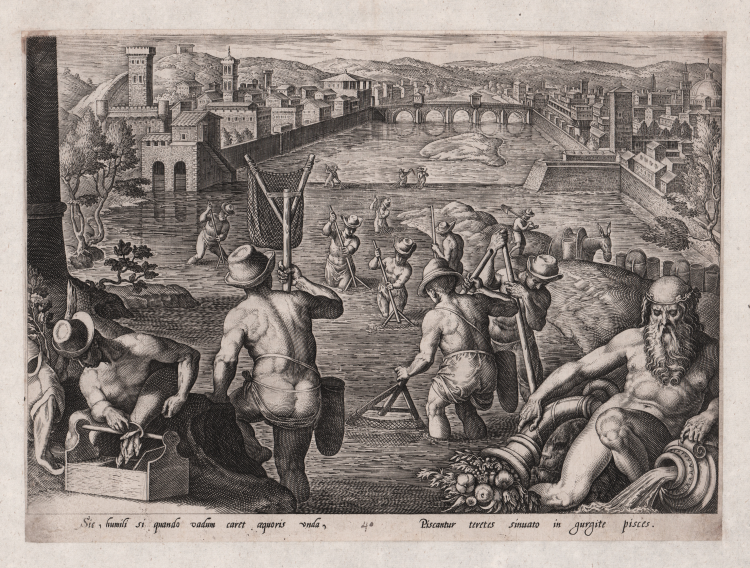




| Reference: | S45947 |
| Author | Philippe GALLE |
| Year: | 1578 |
| Measures: | 290 x 220 mm |



| Reference: | S45947 |
| Author | Philippe GALLE |
| Year: | 1578 |
| Measures: | 290 x 220 mm |
Fishing with Dip Nets on the River Arno; fishermen wade in the river Arno,seen receding into the distance, with dip nets; to left and right, the city of Florence flanks the river; in the right foreground, a river god, holding a cornucopia, is seated upon a lion, representing Florence.
Lettered below the image: 'Sic, humili si quando vadum caret aeqouris unda, / Piscantur teretes sinuato in gurgite pisces.'
Engraving, circa 1578, without signature. Example of the first state, before the number.
From the "Venationes Ferarum, Avium, Piscium", after Jan van der Straet called Stradano or Stradanus, published by Philip Galle.
Once back in Antwerp, after a long trip to Italy, Stradano met Philip Galle, former pupil of Hieronumus Cock, who had recentely devouted himself to the art of printing. They planned together the realization of hunting subjects, inspired by the tapestry of the Villa in Poggio a Caiano. At the beginning, Galle realized a series of engravings without numbers, to which a second edition followed, with title page and 44 numbered plates. The sudden fame of his work convinced the printer to go on with his cooperation with Stradano, who realized new drawings with uncommon and exotic hunting subjects.
The new series was published first separately, then together with the first edition, forming a wide series of 104 plates, named Venationes Ferarum, Avium, Piscium, Pugnae. This work can be dated between 1578 (on the front page) and 1596. As for the tapestry of the Villa in Poggio a Caiano, the work is divided in three wide categories: terrestrial, air and water animals. At the beginning the hunting scenes have been engraved by Philip Galle himself, who then hired other members of his family and other assistants, among which Adriaen and Jan Collaert, Theodor and Cornelis Galle and Carolus de Mallery.
Magnificent work, printed on contemporary laid paper, trimmed to the platemark, in good condition.
Bibliografia
New Hollstein (Dutch & Flemish) / The New Hollstein: Dutch and Flemish etchings, engravings and woodcuts 1450-1700 (460.I); Baroni Vannucci 1997 / Jan van der Straet, detto Giovanni Stradano, flandrus pictor et inventor (693.96).
Philippe GALLE (Haarlem, 1537; Anversa, 12 o 29 Marzo 1612)
|
Draughtsman, engraver, publisher, print dealer, writer and historian. It is possible that he was a pupil in Haarlem of Dirk Volkertsz. Coornhert, but more than likely he was trained in the Antwerp workshop of Hieronymous Cock, who published Galle’s first prints in 1557 and for whom he worked for many years. Shortly after 1557 Philip Galle started his own publishing and print business, for which he travelled extensively: in 1560–61 he visited the southern Netherlands, France, Germany and Italy. After 1564 he settled in Antwerp, where he acquired citizenship in 1571, the same year in which he became a master in the city’s Guild of St Luke. He served as dean of the guild from 1585 to 1587. His documented pupils were H. van Doort in 1580, Karel van Mallery (1571–1635) in 1586, Jean-Baptiste Barbé (1578–1649) in 1594 and Peter Backereel (d 1637) in 1605. Others working at the workshop and publishing house included Philip’s sons Theodor and Cornelis, his son-in-law Adriaen Collaert, pupils van Mallery and Barbé, the Wierix brothers, Hendrick Goltzius, Crispijn de Passe I and other members of the Collaert family.
|
Philippe GALLE (Haarlem, 1537; Anversa, 12 o 29 Marzo 1612)
|
Draughtsman, engraver, publisher, print dealer, writer and historian. It is possible that he was a pupil in Haarlem of Dirk Volkertsz. Coornhert, but more than likely he was trained in the Antwerp workshop of Hieronymous Cock, who published Galle’s first prints in 1557 and for whom he worked for many years. Shortly after 1557 Philip Galle started his own publishing and print business, for which he travelled extensively: in 1560–61 he visited the southern Netherlands, France, Germany and Italy. After 1564 he settled in Antwerp, where he acquired citizenship in 1571, the same year in which he became a master in the city’s Guild of St Luke. He served as dean of the guild from 1585 to 1587. His documented pupils were H. van Doort in 1580, Karel van Mallery (1571–1635) in 1586, Jean-Baptiste Barbé (1578–1649) in 1594 and Peter Backereel (d 1637) in 1605. Others working at the workshop and publishing house included Philip’s sons Theodor and Cornelis, his son-in-law Adriaen Collaert, pupils van Mallery and Barbé, the Wierix brothers, Hendrick Goltzius, Crispijn de Passe I and other members of the Collaert family.
|